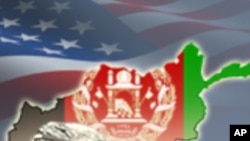<!-- IMAGE -->
Afghanistan’s presidential run-off election on 7 November is expected to keep incumbent Hamid Karzai in power. But journalists who cover the region say fraud and corruption has tainted the Karzai government and the lack of security strategy by the United States and its NATO allies leaves the country far from stable.
President Karzai bowed to international pressure and agreed to a run-off vote after a U.N.-backed investigation found massive fraud in the Afghan elections in August. However, the evidence of election fraud - combined with a record of government corruption – have severely tarnished Mr. Karzai’s legitimacy among Afghans.
Karzai’s Fall In Stature
“People in both Afghanistan and Pakistan have simply lost faith in President Karzai,” said former Pakistani diplomat, journalist, and anthropologist Akbar Ahmed. “They feel he let them down after so many years, so much bloodshed, so many billions of dollars sunk into Afghanistan,” said Ahmed, who now chairs the Islamic studies department at the American University.
Ahmed calls the flawed August election “unforgivable,” saying Karzai failed at that moment in history when he could have turned Afghanistan into a regular functioning democracy. Ahmed says the run-off election is not going a make a difference.
<!-- IMAGE -->
Others note the August election scandal that has since become associated with President Karzai was not his responsibility alone. They say his opponent in the run-off vote, Abdullah Abdullah, shares the blame. “Mr. Karzai is guilty because he is head of state, but Mr. Abdullah is as guilty because he also rigged the vote,” according to Afghan journalist Nabi Misdaq.
President Karzai is likely to win the run-off election, but the price of fraud discovered in the first round may have cost him foreign support. “You can’t expect American, British, and NATO forces to commit their sons and daughters to go and die for a government that’s questionable,” said British journalist Ian Williams – who reports from the United Nations.
Winning the Election vs. Winning the War
The election is a key element in Western plans to stabilize Afghanistan. And a legitimate government in Kabul is critical to U.S. President Barack Obama as he weighs whether to send more troops to Afghanistan. Both the American people – and U.S. lawmakers – are about evenly split over the issue of increasing troop levels.
“It is not clear at that this stage whether the war can be won, no matter how many troops are inserted to fight the Taliban insurgency,” said Williams. The tactics of American troops have been very unpopular with Afghans. “And although most Afghans do not want the Taliban, liberation by foreign troops is never a very happy experience,” Williams added.
Another worrying factor, according to Ahmed, is that the U.S. public seems to be losing interest in Afghanistan. “The United States cannot turn its back on the region,” he argues. Ahmed says people in Afghanistan and Pakistan feel the United States has a record of “packing up and leaving when times get tough.”
Ahmed believes leaving Afghanistan would have a negative impact on Iraq and on America’s economic and political position in the world. “In terms of Realpolitik,” he said, “[The United States] can’t walk away from one of the most vital and important regions in the world.”
Misdaq says the impact on Afghanistan would be even worse. “Neither the United States nor its NATO allies can afford to let Afghanistan descend into the level of chaos that followed Soviet troop withdrawal two decades ago,” said Misdaq. “If NATO even thinks of withdrawing, there will be tremendous war and bloodshed."
Where is the Strategy?
What the situation really boils down to is whether or not a winning strategy can be found. “What is the strategy? What are NATO’s objectives?,” asks Professor Ahmed. “That’s something General (Stan) McChrystal himself made clear he did not know.” Ahmed says other strategic questions remain: “Does the West want a functioning democracy in both Afghanistan and Pakistan? Do they want a complete elimination of the Taliban? Do they want a long-term presence in the region?”
President Obama and his advisors continue to grapple with the most realistic strategy for dealing with the dilemma in Afghanistan. Defense Secretary Robert Gates has asked NATO allies to bolster their support, but he will not publicly discuss whether he will recommend sending more troops to Afghanistan. The White House has said the President may not wait for the election to announce his new plan for Afghanistan.
However, Senator John Kerry – the man who convinced President Karzai to hold a run-off election – urged President Obama to wait until after the results of that country's 7 November election are known before announcing a strategy for the region.
The White House has said only that Mr. Obama will make a decision on the way forward in Afghanistan in the coming weeks, but Kerry told reporters at the White House that "common sense" would dictate that Obama "wait to see what kind of government you have to work with at that time."





